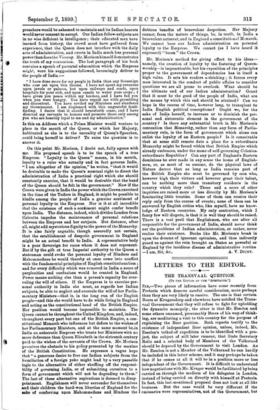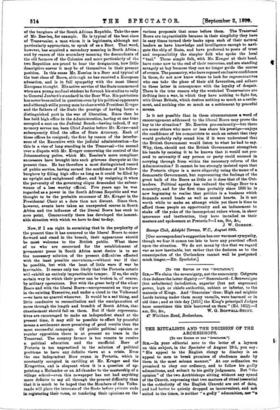LETTERS TO THE EDITOR.
THE TRANSVAAL QUESTION.
LTO THE EDITOR OF THE "SPECTATOR.")
Silt,—Two pieces of information have come recently from Pretoria which deserve careful consideration, more perhaps than they are very likely to receive. The one is that certain Boers at Krugersdorp and elsewhere have notified the Trans- vaal Government that they will refuse to fight for upholding the dynamite monopoly ; the other is that Mr. Esaelen and Some others unnamed, presumably Boers of his way.of think. ing, are meditating a visit to this country for the purpose of explaining the Boer position. Both reports testify to the existence of independent Boer opinion, unless, indeed, Mr. Esselen'e talked-of expedition is to be identified with a pro- ject, the subject of still later rumour, that State Secretary Reitz and a selected body of Members of the Volksraad should be deputed by the Government to visit London. As Mr. Esselen is not a Member of the Volksraad be can hardly be included in this latter scheme, and it may perhaps be taken that if he comes at all it will be in a position more or less independent of the Government. It is difficult to understand how negotiations with Mr. Kruger would be facilitated by being carried on through the medium of his delegates in London, instead of being carried on directly with himself at Pretoria. In fact, this last-mentioned proposal does not look at all like business. But the case would be very different if tits emissaries were representatives, not of the Government, but
of the burghers of the South African Republic. Take the case of Mr. Esselen, for example. He is typical of the beat class of Transvaaler, a man whom it is legitimate, although not particularly appropriate, to speak of as a Boer. That word, however, has acquired a secondary meaning in South Africa ; and by reason of this secondary meaning the descendants of the old farmers of the Colonies and more particularly of the two Republics are proud to bear the designation, how little descriptive eoever it may be of themselves in their present position. In this sense Mr. Esselen is a Boer and typical of the best class of Boers, although he has received a European education, and is in full sympathy with the most liberal European thought. His active service of the State commenced when as a young medical student he forsook his studies to rally to General Joubert's standard in the Boer War. His patriotism has never been called in question even by his political opponents and although stilla young man he shares with President Kruger and the fathers of the State the prestige of having borne a distinguished part in the war of liberation. Since then he has held high office in the Administration, having at one time occupied a seat on the Judicial Bench—having indeed, if my memory serves me, been Chief Justice before Mr. Kotze—and subsequently filled the office of State Attorney. Each of these offices he resigned; the first by reason of the interfer- ence of the Executive with the judicial administration—for this is a vice of long standing in the Transvaal—the second ever a dispute with Mr. Kruger concerning the control of the Johannesburg police, which Mr. Esselen'e more compliant sucoessors have brought into such grievous disrepute at the present time. He has therefore a most distinguished record of public service, haring earned the oonfidence of his fellow- burghers by filling high office as long as it could be filled by an upright and enlightened officer, and by resigning it when the perversity of the governing clique demanded the subaer- vience of a lees worthy officiaL Five years ago he was regarded as a power in the South African Republic and was thought to be the probable successor of Mr. Kruger in the Presidental Chair at a date then not distant. Since then. however, events have taken an unexpected course in South Africa and the influence of the liberal Boers has sunk to zero point Concurrently there has developed the lament- able situation with which we have to deal to-day.
Now, if I am right in surmising that in the perplexity of the present time it has occurred to the liberal Boers to come forward and stand in the breach, their appearance should be most welcome to the British public. What those of us who are concerned for the establishment of permanent peace in South Africa most desire is to see the necessary solution of the present diffieulties effected with the least possible convulsion.—vrithout war if that be possible, but with the least of little wars if war be inevitable. It seems only too likely that the Pretoria coterie will exhibit an entirely impracticable temper. If so, the only certain way in which their power can be broken is, of course, by military operations. But with the great body of the silent Boers and with the liberal Boers—unrepresented as they are in the existing Executive, and under a cloud in the Volksraad —we have no quarrel whatever. It would be a sad thing, and little conducive to reconciliation and the amalgamation of races through the length and breadth of South Africa, that chastisement should fall on them. But if their representa- tives are encouraged to make an independent stand at the present time, it may still be possible to effect by peaceful means a settlement more promising of good results than the most successful campaign. Of public political opinion or regular opposition there is at present no trace in the Transvaal. The country farmer is too remote to receive a political education and the unofficial Boer of Pretoria is too unpractised in the solution of political problems to have any definite views at a crisis, Even the one independent Boer organ in Pretoria, which is constantly occupied in cavilling at Mr. Kruger and the Krugerites, and is eloquent when it is a question of ap- pointing a Hollander or an Afrikander to the mastership of a village school—even this newspaper has not had anything more definite to say all through the present difficulty than that it is much to be hoped that the Members of the Polka- reads will place the interests of the State before private ends in registering their votes, or tendering their opinions on the 1 various proposals that come before them. The Transvaal Boers are impracticable because in their simplicity they have in easy times turned their backs upon such of their natural leaders as have knowledge and intelligence enough to nevi- gate the ship of State, and have preferred to poets of trust and responsibility the simpler folk who spoke the local "teal." These simple folk, with Mr. Kruger at their head, have come now to the end of their resources, and are standing savagely at bay because they can no longer guide the course of events. The peasantry, who have reposed exclusive confidence in them, do not now know where to look for representatives who can take the place of their old favourites, and adhere to these latter in consequence with the loyalty of despair. There is the true reason why the wretched Tranavaalers are drifting into a war, in which they have nothing to fight for, with Great Britain, which desires nothing so much as a settle- ment, and nothing else so much as a settlement by peaceful means.
Is it not possible that in these circumstances a word of encouragement addressed to the liberal Boers may prove the key to the situation? Mr. Esselen pre-eminently—but there are some others who more or less share his prestige—enjoys the confidence of his compatriots to such an extent that they would probably rally round him if it were understood that the British Government would listen to what he had to say. Why, then, should not the British Government strengthen his hands by causing it to be known that it would not pro- ceed to extremity if any person or party could succeed in carrying through from within the necessary reform of the Administration ? It cannot be too strongly insisted upon that the Pretoria clique is a mere oligarchy using the name of a democratic Government, but representing the feelings of the great bulk of the Boera as little as it does that of the Out- landers. Political apathy has reduced the village Boer to a nonentity, and for the first time probably since 1850 he is now beginning to realise that politics is a business which demands sound heads as well as sound hearts. Is it not worth while to make an attempt while yet there is time to afford these people an opportunity and an inducement to shake off the yoke of the incompetent rulers whom, in sheer ignorance and inattention, they have installed as their masters and spokesmen at Pretoria P—I am, Sir, 8ee., J W. GORDON. Savage Club, Adelphi Terrace, W.C., August 28th.
[Our correspondent's suggestion has our warmest sympathy, though we fear it comes too late to have any practical effect upon the situation. We do not mean by this that we regard war as now inevitable, but rather that the decision as to the emancipation of the Outlanders cannot well be postponed . much longer.—En. Spectator.]



































 Previous page
Previous page